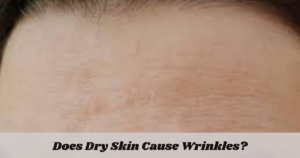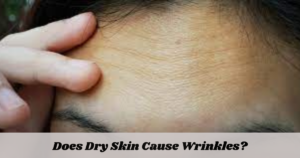The question on many minds is: does dry skin cause wrinkles? It’s a common concern among those striving for youthful, radiant skin. In this comprehensive guide, we’ll delve into the science behind dry skin and its relationship with wrinkles. By exploring the causes, effects, and preventative measures, we aim to provide clarity on this topic.

The Basics: What Exactly is Dry Skin?
Dry skin, medically known as xerosis, occurs when the skin lacks moisture and essential oils. This can result in tightness, flakiness, and sometimes itchiness. Factors like aging, environmental conditions, genetics, and skincare habits can contribute to its development.
Understanding Wrinkles: How Do They Form?
Wrinkles are creases or ridges that develop on the skin, particularly as we age. While they’re a natural part of the aging process, various factors can accelerate their formation. These include UV exposure, smoking, repetitive facial expressions, and yes, dry skin.
Does Dry Skin Cause Wrinkles? Examining the Evidence
Now, let’s address the pressing question: does dry skin cause wrinkles? The answer lies in understanding the impact of moisture loss on skin elasticity. When the skin lacks moisture, it becomes less flexible and more prone to damage from environmental stressors. Over time, this can lead to the formation of wrinkles.
Studies have shown that dry skin can indeed contribute to the development of wrinkles, especially when coupled with other factors such as UV exposure and aging. Dryness compromises the skin’s barrier function, making it more susceptible to oxidative stress and collagen breakdown—key processes in wrinkle formation.
Furthermore, chronic dryness can exacerbate existing wrinkles, making them appear more prominent and deeper. So, while dry skin may not be the sole cause of wrinkles, it certainly plays a significant role in their onset and progression.
Preventing Dry Skin-Induced Wrinkles: Tips and Strategies
Given the implications of dry skin on wrinkle formation, it’s crucial to adopt preventative measures. Here are some practical tips to keep your skin hydrated and youthful:
1. Hydrate Inside and Out
Drinking plenty of water hydrates your skin from within, promoting moisture retention and overall skin health. Additionally, using hydrating skincare products with ingredients like hyaluronic acid and glycerin helps to lock in moisture, keeping your skin plump and supple. Adequate hydration ensures that your skin maintains its elasticity and resilience, reducing the likelihood of fine lines and wrinkles. Hyaluronic acid and glycerin attract and retain moisture in the skin, minimizing dryness and preventing premature aging.
2. Protect Against UV Rays
Daily sunscreen application protects your skin from harmful UV radiation, preventing collagen breakdown and premature aging caused by sun damage. UV exposure accelerates the breakdown of collagen and elastin fibers in the skin, leading to the formation of wrinkles and fine lines. By wearing sunscreen daily, even on cloudy days, you shield your skin from UV-induced damage, preserving its youthful appearance.
3. Nourish Your Skin
A balanced diet rich in antioxidants, vitamins, and essential fatty acids supports skin health and combats oxidative stress, a major contributor to wrinkle formation. Antioxidants help neutralize free radicals in the skin, preventing oxidative damage and reducing the risk of wrinkles. Vitamins such as vitamin C promote collagen synthesis, while essential fatty acids maintain skin barrier function, keeping your skin hydrated and resilient.
4. Humidify Your Environment
Using a humidifier indoors helps maintain optimal humidity levels, preventing excessive moisture loss from the skin, especially during dry winter months. Dry indoor air can dehydrate the skin, leading to dryness and the formation of wrinkles. By humidifying your environment, you ensure that your skin retains moisture more effectively, reducing the risk of dehydration-related wrinkles.
5. Practice Gentle Skincare
Avoiding harsh cleansers and exfoliants preserves the skin’s natural oils and protects the skin barrier, preventing moisture loss and maintaining hydration. Harsh skincare products can strip the skin of its natural oils, leading to dryness and increased susceptibility to wrinkles. Opting for gentle, hydrating formulas helps maintain the skin’s moisture balance, reducing the likelihood of wrinkle formation.

The Importance of Moisturization: Beyond Hydration
Moisturization goes beyond simply hydrating the skin—it plays a crucial role in maintaining its health, resilience, and youthful appearance. In this section, we’ll delve into the significance of moisturization and its impact on skin beyond hydration.
1. Preservation of Skin Barrier Function
Moisturizers help reinforce the skin’s natural barrier, which consists of lipids, proteins, and other substances that protect against external aggressors. A strong, intact skin barrier prevents moisture loss and shields the skin from environmental stressors such as pollutants and irritants. By maintaining optimal barrier function, moisturization helps prevent premature aging and the formation of wrinkles.
2. Enhancement of Skin Elasticity
Properly moisturized skin is more supple and elastic, allowing it to bounce back from stressors and maintain its smooth texture. Loss of elasticity is a hallmark of aging skin and contributes to the development of wrinkles. Moisturizers containing ingredients like hyaluronic acid and peptides help improve skin elasticity, reducing the appearance of fine lines and wrinkles over time.
3. Promotion of Skin Repair and Regeneration
Moisturizers often contain ingredients that support skin repair and regeneration, such as vitamins, antioxidants, and amino acids. Regular moisturization promotes cell turnover and collagen synthesis, key processes in maintaining youthful skin. By providing the skin with essential nutrients and support, moisturizers help prevent and minimize the appearance of wrinkles and other signs of aging.
4. Prevention of Trans-Epidermal Water Loss (TEWL)
Moisturizers create a protective barrier on the skin’s surface, preventing water loss and maintaining optimal hydration levels. Trans-epidermal water loss (TEWL) occurs when moisture evaporates from the skin, leading to dryness and dehydration. By sealing in moisture, moisturizers help prevent TEWL, keeping the skin hydrated and reducing the risk of wrinkle formation.
5. Improvement of Skin Texture and Tone
Regular moisturization improves the overall texture and tone of the skin, making it appear smoother, brighter, and more youthful. Dry, rough skin is more prone to wrinkles and other signs of aging. By keeping the skin well-hydrated and nourished, moisturizers help maintain a healthy skin texture and minimize the appearance of fine lines and wrinkles.
Conclusion
In conclusion, the answer to “Does dry skin cause wrinkles?” is a resounding yes, albeit with some nuance. While dry skin alone may not be solely responsible for wrinkles, it certainly contributes to their development and progression. By prioritizing hydration, sun protection, and overall skin health, you can mitigate the effects of dryness and maintain a youthful complexion for years to come. Remember, healthy skin is a reflection of diligent care and nourishment—so embrace a skincare routine that prioritizes hydration and protection.

